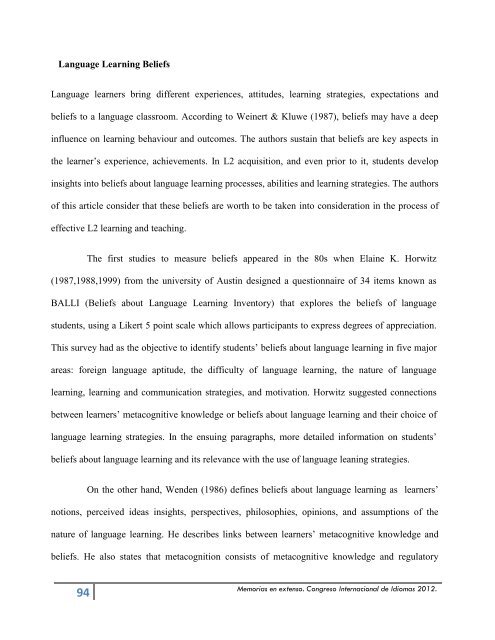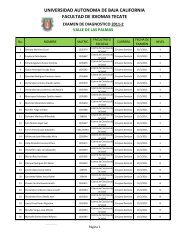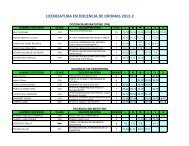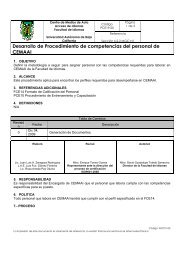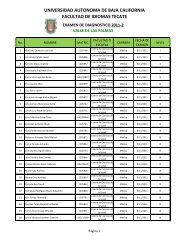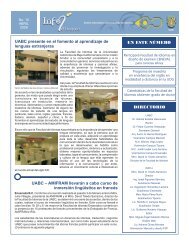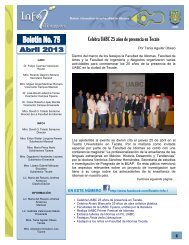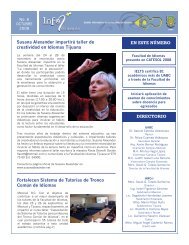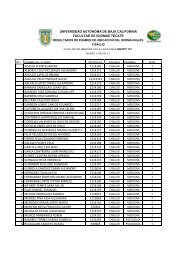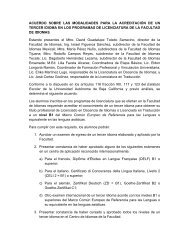- Page 1 and 2:
Tania Aguilar Obeso (coordinadora)
- Page 3 and 4:
Comité OrganizacionalCoordinadora
- Page 5 and 6:
Memorias en extensoCongreso Interna
- Page 7 and 8:
Contenidos/ContentsI. Proceso de en
- Page 9 and 10:
La escritura como rescate de experi
- Page 11 and 12:
él se ha preparado (lengua, histor
- Page 13 and 14:
compartir” no es una actitud dese
- Page 15 and 16:
docente determinada e, igualmente,
- Page 17 and 18:
escrito dirigido a nuestros alumnos
- Page 19 and 20:
consume tiempo, pero es precisament
- Page 21 and 22:
sentimiento -positivo o negativo- y
- Page 23 and 24:
ien” nuestro trabajo, debemos bus
- Page 25 and 26:
c. Revisión: consiste en dejar pas
- Page 27 and 28:
estructura. Huelga mencionar que en
- Page 29:
los dos puntos anteriores‒ y much
- Page 32 and 33:
ii. Seleccionar el código, el regi
- Page 34 and 35:
ser publicados. Los actuales progra
- Page 36 and 37:
American Psychological Association
- Page 38 and 39:
Durante el tercer Congreso Universa
- Page 40 and 41:
carece de un sistema de palabras de
- Page 42 and 43:
Después de muchos años de colabor
- Page 44 and 45: Estudiante-docente, en el proceso d
- Page 46 and 47: transcurso de su vida académica en
- Page 48 and 49: Dado que la mayoría de la informac
- Page 50 and 51: sería que el tutor aprovechara la
- Page 52 and 53: ¿Es posible el aprendizaje y la ad
- Page 54 and 55: Las redes sociales pueden impactar
- Page 56 and 57: Oldenburg (1989) señala que estas
- Page 58 and 59: comprensión acerca de las activida
- Page 60 and 61: Basados en el hecho de que la ense
- Page 62 and 63: Livemocha es una plataforma de e-le
- Page 64 and 65: herramientas que les permitan actua
- Page 66 and 67: Feuerstein, R., Feuerstein, R. S.,
- Page 68 and 69: La prosodia, reto para docentes de
- Page 70 and 71: Al evaluar los resultados, surgen d
- Page 72 and 73: que la motivación es mayor cuando
- Page 74 and 75: Bartolí Rigol, M. (2005). La pronu
- Page 76 and 77: Taller de aprendizaje 四 字 熟
- Page 78 and 79: adquirir una forma de distinguir lo
- Page 80 and 81: Cuadro 1. Marco de referencia para
- Page 82 and 83: BibliografíaAoto, Y., Momose, T. &
- Page 84 and 85: Los estudiantes necesitan sentirse
- Page 86 and 87: dichas lenguas. Janés Carulla (200
- Page 88 and 89: en esta área coinciden en que a lo
- Page 90 and 91: ConclusionesLa UNESCO reconoce que
- Page 92 and 93: Delors, J. (1997). La educación o
- Page 96 and 97: eported by some of our students as
- Page 98 and 99: 2. Teacher’s correction in L2 lea
- Page 100 and 101: 5. L2 practice in relation to langu
- Page 102 and 103: Furthermore, applying specific stra
- Page 104 and 105: El Marco común europeo de referenc
- Page 106 and 107: comunicación sencillas; el indepen
- Page 108 and 109: A través de esta metodología, se
- Page 110 and 111: promovido entre sus estudiantes la
- Page 112 and 113: cartas personales sencillas. Con es
- Page 114 and 115: The Pedagogy of PronunciationMargar
- Page 116 and 117: “factors involved in the intellig
- Page 118 and 119: 4. Guided practice with feedback.5.
- Page 120 and 121: eing accorded to suprasegmental tha
- Page 122 and 123: Políticas lingüísticas del Estad
- Page 124 and 125: No obstante, a lo largo de las tres
- Page 126 and 127: En el plano internacional, decisiva
- Page 128 and 129: ConclusiónLas leyes aprobadas por
- Page 130 and 131: La percepción del profesor de ingl
- Page 132 and 133: En este marco la investigación aqu
- Page 134 and 135: 2. MétodoLos datos que aquí se pr
- Page 136 and 137: objetivos están directamente relac
- Page 138 and 139: Esto nos dice que los retos de la i
- Page 140 and 141: En cuanto a la percepción más gen
- Page 142 and 143: Stenhouse, L. (1980). Curriculum re
- Page 144 and 145:
taking a look at, and what’s a wa
- Page 146 and 147:
English for other subjects such as
- Page 148 and 149:
special is to create an event for t
- Page 150 and 151:
page was last updated. Finally, wit
- Page 152 and 153:
académicas y personales que podrí
- Page 154 and 155:
personal. Puede describir acontecim
- Page 156 and 157:
9. Inteligencia existencial, que se
- Page 158 and 159:
El BALLI contiene una serie de cree
- Page 160 and 161:
Se seleccionó el test BALLI de Hor
- Page 162 and 163:
tecatenses lo confirman), y que un
- Page 164 and 165:
Para concluir es importante mencion
- Page 166 and 167:
White, C. (1999). Expectations and
- Page 168 and 169:
Lehmann (n. d.) argues that the two
- Page 170 and 171:
Trudgill (1999), on the other hand,
- Page 172 and 173:
Everyone will agree that because of
- Page 174 and 175:
ANNEX 1Sample of Surveys presented
- Page 176 and 177:
La investigación en el aula y el p
- Page 178 and 179:
programas institucionales que promu
- Page 180 and 181:
formación profesional del maestro
- Page 182 and 183:
descriptiva y experimental, parecie
- Page 184 and 185:
válidos; ahora es aquel que se rec
- Page 186 and 187:
el conocimiento y la educación, la
- Page 188 and 189:
está realizando el estudio en el a
- Page 190 and 191:
sucedan. Entre ellos se encuentran
- Page 192 and 193:
condiciones que ahí imperan no son
- Page 194 and 195:
La propuesta que se desea presentar
- Page 196 and 197:
desean alcanzar (el número de tema
- Page 198 and 199:
municaciónIIPlanteamiento delos ob
- Page 200 and 201:
Cuadro 2. Fases del proceso de inve
- Page 202 and 203:
el hombre tiene por investigar debe
- Page 204 and 205:
Martínez Miguélez, M. (2004). Cie
- Page 206 and 207:
of SLA arises, one automatically po
- Page 208 and 209:
a reward or a punishment for his re
- Page 210 and 211:
that country (p. 163).Clearly, in o
- Page 212 and 213:
agree with the assertion that they
- Page 214 and 215:
influence in the decision of studyi
- Page 216 and 217:
CONCLUSIONTo summarize, it is evide


